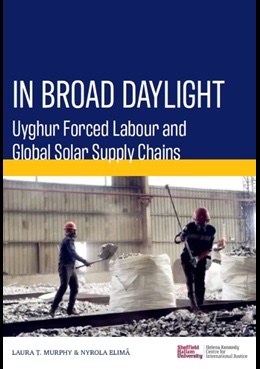
Uighurs: Forced labor in solar panel production:
-China’s Uighur forced labor expands-
-Involved in the Polysilicon supply chain-
Chinese solar panels:
In “China’s Solar Panel Production and Supply Chain”
“Forced labor and human rights violations against Uighurs” has been pointed out in overseas research papers.
Hudson Institute Dialogue:
A dialogue with the Hudson Institute in March.
Hudson Institute
Nourie Turkel
We talked with Laura Murphy of Shefield Haram University on this issue.
Report “In Broad Daylight”:
-2021 report “In Broad Daylight”-
Xinjiang Uygur Autonomous Region:
It accounts for 45% of the world’s total production share of polysilicon for solar panels.
China’s polysilicon industry shifted to Xinjiang five years ago.
Reasons for the Xinjiang shift:
Not only cheap coal energy
Forcibly used Uighur surplus workers for the polysilicon industry.
“Financial and tax incentives such as subsidies” is cited as the reason.
The Epoch Times
https://mb.epochtimes.jp/2022/05/107004.html
Ouïghours : Travail forcé dans la production de panneaux solaires :
-Le travail forcé ouïghour en Chine se développe-
-Impliqué dans la chaîne d’approvisionnement du silicium polycristallin-
Panneaux solaires chinois :
Dans “Production de panneaux solaires et chaîne d’approvisionnement en Chine”
“Le travail forcé et les violations des droits de l’homme contre les Ouïghours” ont été signalés dans des documents de recherche à l’étranger.
Dialogue de l’Institut Hudson :
Un dialogue avec l’Institut Hudson en mars.
Institut Hudson
Nourie Türkel
Nous avons discuté avec Laura Murphy de l’Université Shefield Haram à ce sujet.
Rapport “En plein jour”:
-Rapport 2021 “En plein jour”-
Région autonome ouïghoure du Xinjiang :
Il représente 45% de la part de la production mondiale totale de polysilicium pour panneaux solaires.
L’industrie chinoise du polysilicium s’est déplacée vers le Xinjiang il y a cinq ans.
Raisons du changement au Xinjiang :
Non seulement l’énergie du charbon bon marché
Employé de force des travailleurs excédentaires ouïghours pour l’industrie du polysilicium.
“Les incitations financières et fiscales telles que les subventions” sont citées comme raison.
Les temps d’époque
Uiguren: Zwangsarbeit in der Solarpanel-Produktion:
-Chinas uigurische Zwangsarbeit weitet sich aus-
-Beteiligt an der Polysilizium-Lieferkette-
Chinesische Sonnenkollektoren:
In “Chinas Solarmodulproduktion und Lieferkette”
In ausländischen Forschungsberichten wurde auf „Zwangsarbeit und Menschenrechtsverletzungen gegen Uiguren“ hingewiesen.
Dialog des Hudson Institute:
Ein Dialog mit dem Hudson Institute im März.
Hudson-Institut
Nurie Turkel
Wir haben darüber mit Laura Murphy von der Shefield Haram University gesprochen.
Bericht “Am hellichten Tag”:
-Bericht 2021 “Am hellichten Tag”-
Autonome Region Xinjiang der Uiguren:
Es macht 45 % des weltweiten Produktionsanteils von Polysilizium für Solarmodule aus.
Chinas Polysiliziumindustrie ist vor fünf Jahren nach Xinjiang verlagert worden.
Gründe für die Verschiebung in Xinjiang:
Nicht nur billige Kohleenergie
Zwangsweise eingesetzte uigurische Überschussarbeiter für die Polysiliziumindustrie.
Als Grund werden „finanzielle und steuerliche Anreize wie Subventionen“ genannt.
Die Epochenzeiten
In Broad Daylight :Uyghur Forced Labour in the Solar Supply chains
Sheffield Hallam University
In Broad Daylight :
reveals how forced labour in the Uyghur region has ripple effects throughout international solar supply chains.
People’s Republic of China (PRC)
has placed millions of Uyghur and Kazakh citizens from the Xinjiang Uyghur Autonomous Region
into what the government calls
surplus labour(富余劳动力)
labour transfer(劳动力转移)
programmes.
An official PRC government
report published in November 2020 documents the “placement” of 2.6 million minoritised citizens
in jobs in farms and factories within the Uyghur Region and across the country through these state-sponsored “surplus labour” and “labour transfer” initiatives.
It is critical that
we examine the particular goods that are being produced as a result of this forced labour regime.
This paper focuses on just one of those industries
– the solar energy industry –
reveals the ways forced labour in the Uyghur Region can pervade an entire supply chain and reach deep into international markets.
We concluded that the solar industry is particularly vulnerable to forced labour in the Uyghur Region
because:
95% of solar modules rely on one primary material – solar-grade polysilicon.
Polysilicon manufacturers in the Uyghur Region account for approximately 45% of the world’s solar-grade polysilicon supply.
All polysilicon manufacturers in the Uyghur Region have reported their participation in labour transfer programmes and/or are supplied by raw materials companies that have.
In 2020, China produced an additional 30% of the world’s polysilicon on top of that produced in the Uyghur Region, a significant proportion of which may be affected by forced labour in the Uyghur Region as well.
In the course of this research, we identified:
11 companies engaged in labour transfers
4 additional companies located within industrial parks that have accepted labour transfers
90 Chinese and international companies whose supply chains are affected
Sheffield Hallam University